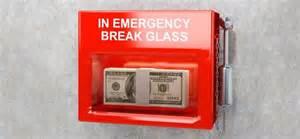
Rules for Financial Freedom
Here is the second installment of rules you can follow that will help you attain financial freedom.
An emergency fund is the foundation of a strong financial plan. Before investing for long-term goals you should make sure you have an emergency fund in place. As you move through life trying to accumulate wealth, debt will be your biggest enemy. Avoiding debt should be one of your major objectives. An emergency fund allows you to stay debt free when an emergency arises. Instead of using a credit card, taking out a home equity loan, or using some other debt instrument, you can tap into your emergency fund.
Typically, your emergency fund should be funded with three to six months of fixed living expenses. If you took my advice in my last blog and created a budget, it will be easy for you to determine this amount. Your emergency funds should be invested in something that is safe and liquid. You never know when an emergency might arise. When it does, you need to have immediate access. Also, you can’t afford to have your emergency fund invested in something that fluctuates in value. You don’t want a situation where your emergency fund is invested in stocks, an emergency occurs and when you need the money the stock market has just dropped and your funds have lost significant value.
The best vehicles for emergency funds are savings and money market accounts. They meet the safe and liquid criteria. Remember, once you have tapped into your emergency fund, build it back up to where it should be. I'd be happy to discuss your emergency fund plan.

